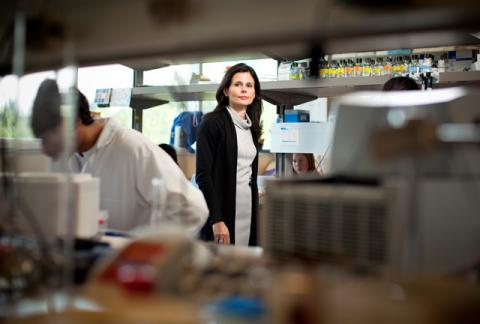I ricercatori mettono in guardia dall'aumento "esponenziale" delle prescrizioni di antipsicotici ai minori. Di By Sharon Kirkey, Postmedia News June 10, 2013 9:23. Nella fotografia Dr. Dina Panagiotopoulos, professore associato in pediatria e endocrinologa presso l'Ospedale Infantile di Vancouver, Canada. Foto di Ben Nelms di Postmedia News, Postmedia News. Fonte: http://www.canada.com
Alcuni ricercatori canadesi mettono in guardia sull'allarmante aumento "esponenziale" nella prescrizione di farmaci antipsicotici ai bambini. Prescrizioni per alcune dei più potenti psicofarmaci sul mercato - i cosiddetti antipsicotici "seconda generazione", o SGA - a giovani fino ai 18 anni, una prescrizione che un nuovo studio prova essere aumentata nella Columbia Britannica di 18 volte solo tra il 1996 e il 2011, con. alcuni dei più alti aumenti nelle prescrizioni indirizzate a bambini intorno ai sei anni di età. I bambini vengono trattati con potenti farmaci antipsicotici per una vasta gamma di diagnosi non approvate dall'Istituto Sanitario del Canada [Canada Health, N.d.T.], dichiarano i ricercatori, e non solo gli psichiatri, ma anche i medici di famiglia e pediatri sono sempre più inclini a prescrivere le pillole. Il fenomeno "è di grande preoccupazione" dato il diffondersi di prove che dimostrano come i farmaci possono causare rapido aumento di peso, ipertensione, diabete e altre gravi effetti collaterali che rendono i bambini vulnerabili ad un aumento del rischio di infarto e ictus quando saranno più vecchi. I rapporti del gruppo di ricerca sono pubblicati nel numero di giugno della Rivista Canadese di Psichiatria [Canadian Journal of Psychiatry, N.d.T.] .
***
Researchers warn of 'exponential' rise in prescribing antipsychotic drugs to children. By Sharon Kirkey, Postmedia News June 10, 2013 9:23 AM Photo ( 1 ): Dr. Dina Panagiotopoulos, associate professor of pediatrics at the University of B.C. and an endocrinologist at BC Children’s Hospital, is pictured at the B.C Childrens Hospital in Vancouver. Photograph by: Ben Nelms for Postmedia News , Postmedia News. Source: http://www.canada.com
Canadian researchers are warning of an alarming and “exponential” rise in prescribing antipsychotic drugs to children. Prescriptions for some of the most powerful psychiatric drugs on the market — so-called “second-generation” antipsychotics, or SGAs — to youth aged 18 and under increased 18-fold in British Columbia alone between 1996 and 2011, a new study finds, with some of the highest increases in prescriptions to boys as young as six.
Children are being put on the potent drugs for a wide range of diagnoses not approved by Health Canada, the researchers say, and not only psychiatrists, but also family doctors and pediatricians are increasingly prescribing the pills.
The phenomenon “is of great concern” given emerging evidence showing that the drugs can cause rapid weight gain, high blood pressure, diabetes and other serious side effects that make children vulnerable to an increased risk of heart attack and stroke when they’re older, the research team reports in the June edition of the Canadian Journal of Psychiatry.
The study is based on data from the B.C. health ministry. Researchers looked at rates of prescribing of both older, “first generation” antipsychotics, and the newer SGAs. Overall, the total number of children under 18 who received an antipsychotic prescription increased to 5,791 in 2011 from 1,583 in 1996 — a nearly four-fold jump. But the total number of youth who specifically received an SGA increased to 5,432 from 315 over the study period. That translates into a 18-fold increase in the overall rate of prescribing. By 2011, second-generation antipsychotics accounted for 96 per cent of all antipsychotic prescriptions for youth, the team reports. The most frequently prescribed drugs were risperidone, quetiapine and olanzapine. The highest increase was among boys aged 13 to 18, where the rate rose more than four-fold. But similar increases were seen in boys aged six to 12, as well as 13- to 18-year-old girls. The three most common reasons given by doctors for prescribing the drugs were depression, “hyperkinetic syndrome of childhood” — a grab bag diagnosis for attention deficit hyperactivity disorder and other disruptive behaviour disorders — and “neurotic disorders” such as anxiety. “These medications seem to be a common ‘go to,’ ” said lead author Dr. Dina Panagiotopoulos, an associate professor of pediatrics at the University of B.C. and an endocrinologist at BC Children’s Hospital.
However, only one study has tested second-generation antipsychotics in adolescents with symptoms of depression who had bipolar disorder and it showed no improvement in depressive symptoms whatsoever, she said. “In spite of that, there’s a lot of prescribing happening in adolescents for depression,” she said.
The drugs are also being used in children under five, and the biggest prescribers to preschoolers are pediatricians. Only one of the drugs, Abilify, has been approved for youths aged 13 to 17. There is a perception among doctors, driven by drug company marketing, that SGAs are safer than older antipsychotics and cause less muscle rigidity, spasms and other disturbing movement disorders. But Panagiotopoulos says the new drugs carry some of the same side effects as the ones they replaced, in addition to potentially serious metabolic problems. Her earlier studies have shown that once doctors are made aware of the side effects and the monitoring required, “they aren’t so keen to prescribe them.”
Panagiotopoulos, a clinician scientist at the Child & Family Research Institute, says children are being put on the drugs for poor sleep, “and there is absolutely no evidence for sleep, at all.” Although the study was specific to B.C., the researchers expect the results would be the same in other parts of the country. The B.C. researchers have received funding to develop an online tool to help doctors better prescribe antipsychotics and monitor their side effects.
Specialized psychiatric services are stretched, leaving family doctors to bear the brunt of mental health care, Panagiotopoulos said. “We need to support them to do it properly.”
[email protected]
Twitter.com/sharon_kirkey

